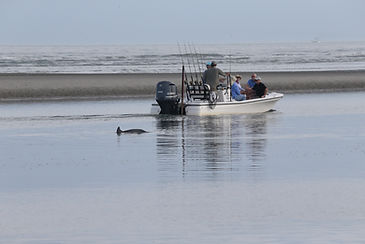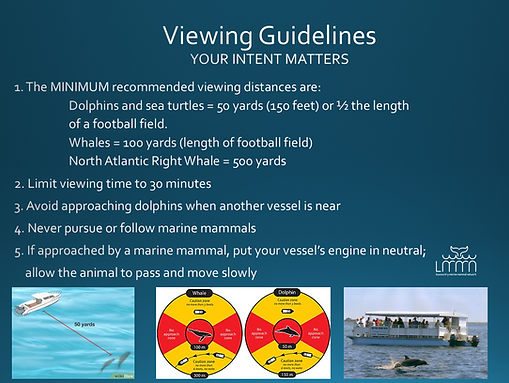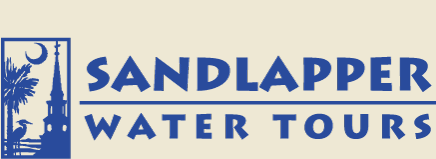
.png)
W.A.V.E. Workshops
Wildlife Awareness & Viewing Etiquette
Program description
W.A.V.E., which stands for Wildlife Awareness & Viewing Etiquette, is a half-day educational workshop led by Lowcountry Marine Mammal Network with the goal to promote responsible boating and viewing etiquette of marine wildlife of South Carolina, with a focus on bottlenose dolphins and sea turtles. Two workshops are being offered - one geared towards commercial businesses that frequently operate on the water and the other to recreational boaters and the general public.
By joining a workshop, you or your business can become W.A.V.E. Ambassadors, indicating your commitment to responsible wildlife viewing and marine conservation.

Workshop Details
Date:
Saturday, March 29th, 9-1pm
Location:
Marine Resources Research Institute
217 Ft. Johnson Road, Charleston, SC 29412
Time:
9 AM to 1 PM
Light refreshments and pastries will be provided
Attendees will receive a certification of completion, WAVE stickers,
and a bag of goodies
BACKGROUND
South Carolina waters are home to several marine mammal and sea turtle species. Boaters often share the same waterways, creating a dynamic coexistence where responsible boating and viewing practices are essential to minimize the impact on ecosystems and species that inhabit these environments.
Tamanend’s bottlenose dolphins (Tursiops erebennus) are the only resident marine mammal in South Carolina year-round. They have ranging patterns extending across the South Carolina coast and within the estuarine systems. In the Charleston area alone, there is a resident population of about 300 dolphins.
_JPG.jpg)
Despite dolphins being federally protected under the Marine Mammal Protection Act (1972), there have been long-standing issues of human interaction towards these dolphins, with boat strikes and entanglements in marine debris being common causes of mortality. The illegal feeding, touching, and harassment from commercial and recreational boaters also continues to be a source of disturbance to local dolphins. Dolphins that engage in strand feeding, a rare foraging strategy, face greater levels of disturbance as this behavior happens near shorelines. NOAA has documented incidents of people, both from land and vessel/kayak, trying to interact with or feed dolphins during strand feeding. People have also been reported for trying to grab, jump, or stand on the animals.
Human interaction with marine mammals can cause disturbance towards the animals. Studies have shown that human disturbance, especially the presence of tour vessels and other watercraft, can lead to a decline in dolphin abundance in that area or can cause them to change and/or stop their normal foraging behavior. Other critical behaviors, such as maternal care and resting are also particularly vulnerable to disturbance.

In addition to marine mammals, sea turtle populations are also at risk due to the result of human activities. Four species of sea turtles (loggerhead, Kemp's ridley, green and leatherback) can be found in South Carolina's near shore waters April through November, or nesting on our beaches from May through October. Sea turtles face significant threats including accidental capture in commerical fisheries, nesting site disturbance, and collisions with boats, all of which jeopardize their reproductive success and overall population health

Mission and Goals of W.A.V.E.
LMMN is launching the W.A.V.E. Workshop in response to these issues with the mission to promote awareness and responsible viewing of dolphins and other marine wildlife of South Carolina and reduce instances of disturbance and harassment.
Goals of the workshop include:
-
Species Identification: Learn to identify the various marine mammals, including bottlenose dolphins, and sea turtle species found in South Carolina's coastal waters. Understand their behaviors, habitats, and significance in the local marine ecosystem.
-
Conservation Challenges: Explore the unique conservation challenges faced by marine mammals and sea turtles in South Carolina, including boat and fishing-related threats, and the impact of human activities on their populations.
-
Responsible Viewing Guidelines: Gain insights into responsible viewing practices that minimize harassment to marine life and learn to identify signs of disturbance. Understand the importance of responsibly viewing wildlife from boats, from land, and from the air.
-
Legislation and Regulations: Familiarize yourself with the existing legislation and regulations in South Carolina aimed at protecting marine mammals and sea turtles. Learn how compliance contributes to the preservation of these species.
-
The Role of Advertising/Responsible Tourism: Businesses - Discuss the role of advertising in promoting responsible wildlife viewing. Learn how you can advertise for your business in ways that don't promote engaging with wildlife in ways that may lead to disturbance or harassment. General Public - learn how responsible tourism choices can impact wildlife on a local and global scale.
-
Q&A Session: Have your questions answered by marine biologists and conservation experts. Guest speakers include SCDNR Sea Turtle Program, NOAA National Ocean Service, and NOAA Law Enforcement. Gain valuable insights into specific issues related to marine mammals and sea turtles in South Carolina.
Value of being a W.A.V.E. Ambassador

Criteria of being a W.A.V.E. Ambassador
-
Need to attend one workshop (only one person from a business needs to attend to represent that business)
-
Conduct educational briefings to passengers about W.A.V.E. and how they will be adhering to responsible viewing guidelines
-
Engage in responsible advertising across all platforms (i.e., print, website, social media, etc.)
-
Fully comply with the Marine Mammal Protection Act, report violations or marine mammal or turtle strandings, and follow all guidelines to prevent disturbance or harassment towards marine wildlife
.png)
.png)
W.A.V.E. Ambassadors
LMMN is proud to support the following businesses as W.A.V.E. Ambassadors who are committed to marine conservation and the responsible viewing of wildlife in coastal South Carolina:
Click on each picture to be directed to their website & book a tour!
Charleston
Hilton Head and Beaufort area
.png)
.jpg)








.png)
.jpeg)



.jpeg)




.jpg)
